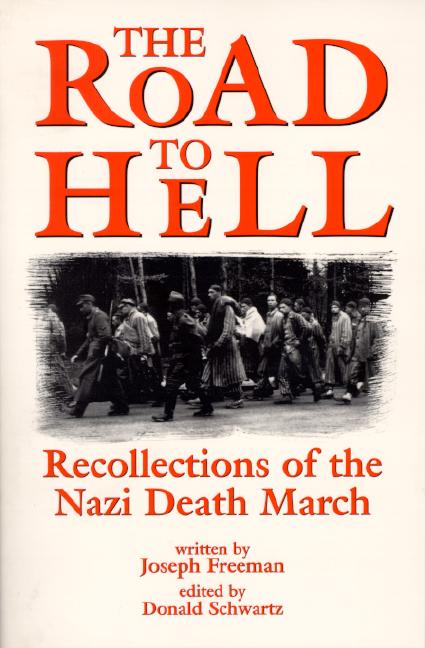"Of all the horrors of World War II, perhaps none was a vicious or as pointless as the Nazi Death Marches. With the war lost and most of the camps in Allied hands, the Germans marched tens of thousands of sick, emaciated and famished prisoners–Jews, Russians, Poles, Gypsies and others–to their death, often egged on by the local German population. A survivor of the Death March, for fifty years Joseph Freeman was too traumatized about the event to write about the horror he endured. Freeman's book is both an important Holocaust testimony and a contribution to the on-going debate on "Hitler's Willing Executioners"."–Dr. Richard Rubenstein, author of After Auschwitz
...I didn't want my tears to fall on the pages
"The Road to Hell is a graphic account of the infamous Nazi death
march from Auschwitz–how starvation, freezing, clubbing, and bullets to
the head eliminated thousands of marchers–described in jarring detail
by Joseph Freeman, one of the very few survivors.... I held the book up
in front of me so that my tears would not fall on the pages."–George
W. Feinstein, Professor Emeritus, Pasadena City College, California
A searing book, painful, powerful, and truthful
"Joseph Freeman's The Road to Hell: Recollections of the Nazi Death
March is quite simply the most powerful detailed description of the
final moments of destruction when the defeated Nazis marched the concentration
camp inmates until they died or walked through death. I kept thinking
of the Psalmist who proclaimed "The Lord has afflicted me with a multitude
of afflictions, but Death he has not given me." The ultimate affliction
as freeman so poignantly describes was not to yield to death but to go
on and on, to ever greater measures of suffering, ever deeper levels of
dehumanization.
This is a searing book,
painful and powerful precisely because it is so truthful ."–Michael
Berenbaum, President, Survivors of the Shoah Visual Foundation, Author
of The World Must Know and coeditor of Holocaust, Religious and
Philosophical Implications
Uses language with clarity, simplicity, and compactness
Freeman uses language with the clarity, simplicity, and compactness
that identify a gifted writer. His memoir was carefully researched. Drawing
profoundly on his personal experience, Freeman has succeeded in doing even
more because he has subtly contextualized his story within the larger history
of the Holocaust's immense devastation. Some of Freeman's chapters provide
glimpses into a part of the Holocaust's history that has been discussed
much less–even in survivor testimony–than what happened, for example, to
Jews in ghettos or camps. Namely the infamous death marches that took place
in the last months of World War II, well after the military tide had turned
against Nazi Germany and its killing centers on Polish soil–Auschwitz-Birkenau
among them–had been shut down and evacuated.
Table of Contents
Preface
Dedication and Acknowledgments
Map of the Death March
Introduction
Part One: The Preparation for Hell
Chapter One To Spaichingen:
A New Place Of Misery
Chapter Two The Night
Before The March
Chapter Three The Last Morning
Before The Death March
Chapter Four Pictures
Of My Past
Part Two: The Death March–The Road To Hell
Chapter Five The First Day
On The Road
Chapter Six The
Second Day On The Road
Chapter Seven The Third Day On The Road
Chapter Eight The Fourth
Night On The Road
Chapter Nine The Seventh
Day On The Road
Chapter Ten One
Month Into The March
Chapter Eleven A Face From The Past: The Story
Of Leo Goldfarb
Chapter Twelve Jacob, The Young Martyr
Chapter Thirteen Blood Alley
Chapter Fourteen Five Minutes Before Twelve
Part Three: Deliverance
Chapter Fifteen The First Days Of Liberation
Chapter Sixteen Adjusting To Freedom
Chapter Seventeen An Unsteady Recovery
Epilogue
Afterword
Notes
Glossary
JOSEPH FREEMAN was born in Radom, Poland in 1915. He attended Wolna Wszechnica Polska (Private University) of Warsaw. In 1939 he had been accepted at the Medical Faculty at the University of Warsaw but his study was interrupted by the war. He survived three death camps serving as a surgeon and also survived the death march. He is married to another holocaust survivor and is retired and works for the ADL and Martyr's Memorial Holocaust Museum. He is also author of Job: The Story of a Holocaust Survivor.
DONALD SCHWARTZ is a professor in the history department at California State University Long Beach where he teaches courses in European diplomacy and the Holocaust. He has written numerous articles on the teaching of the Holocaust and has interviewed numerous survivors for Stephen Spielberg's Visual History of the Shoah Project.






